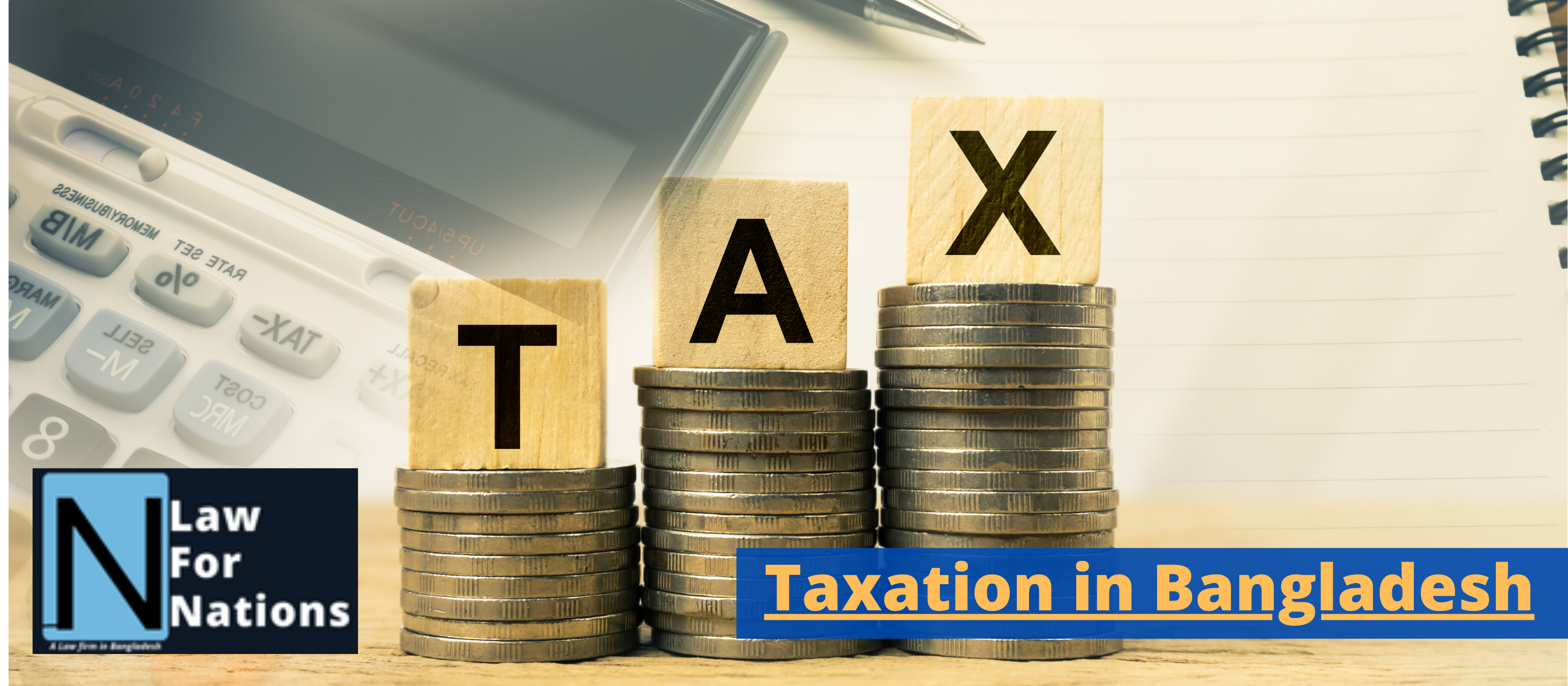
Taxation in Bangladesh
In Bangladesh, the principal taxes are Customs duties, Value-Added-Tax (VAT), supplementary
duty, income tax and corporation tax.
CONTENTS
1. Income tax
2. Value Added Tax
3. Corporate tax rates
4. Tax holidays
5. National Board of Revenue
Income tax
The history of income tax in Bangladesh dates back to 1860 when it was introduced by the
British Raj under the title Income Tax Act. Since then various changes have taken place.
FY 2021-2022 Rate Tax bracket
0% Up to ৳3,00,000
10% ৳4,00,000 to ৳7,00,000
15% ৳7,00,000 to ৳11,00,000
20% ৳11,00,000 to 16,00,000
25% Above ৳16,00,000
Value Added Tax
The standard rate of VAT is 15% levied on transaction value of most of the imports and supplies
of goods and services.
Corporate tax rates
The tax law imposes income tax at 25 percent on listed entities and 32.5 percent for non-listed
entities. Corporate tax rate changes announced this year includes:
An additional surcharge of 2.5 percent on income of companies in the tobacco sector
a reduction of the corporate income tax rate for companies in the readymade garments
sector to 15 percent (from 20 percent)
a further 1 percent rate reduction (to 14 percent) for companies in the readymade
garments sector that have an internationally recognized green building certificate.
Certain companies remain taxed at different rates. For example:
Banking companies, insurance companies and non-banking financial institutions are
taxed at 40 percent if they are listed and 42.5 percent if non-listed.
Cigarette manufacturers and mobile phone operator are taxed at 45 percent (before the
additional surcharge on cigarette manufacturers noted above)
Companies engaged in production and export of knitwear and woven garments enjoy
reduced corporate tax rates of 20 percent, and
Companies that produce or export jute products are taxed at 10 percent.
Generally, a company's export earnings are 50 percent exempt.
For companies, the tax day (i.e. tax return due date) is now the 15th day of seventh month
following the end of income year; alternatively, where that fifteenth day is before 15 September,
the tax day is 15 September of the year following the end of the income year.
Tax holidays
Finance Bill 2017 makes no changes to the current tax legislation providing tax holidays for:
industries established in export processing zones (5 to 7 years, depending on location)
investment in economic zones (10 years) and development of economic zones (12 years)
industrial undertakings (5 to 10 years, depending on location)
physical infrastructure (10 years)
coal-based private power generation companies (15 years)
Non-coal-based power generation companies (10 years).
The tax holiday (until 2024) for companies engaged in “information technology enabled
services” also remains intact, although Finance Bill 2017 includes specifically defines
these services.
National Board of Revenue
The National Board of Revenue (NBR) is the central authority for tax administration in
Bangladesh. Administratively, it is the attached department to the Internal Resources Division
(IRD) of the Ministry of Finance (MoF). MoF has 4 Divisions, namely –
A. The Finance Division the
B. Internal Resources Division (IRD),
C. The Banking Division and
D. The Economic Relations Division (ERD).
Each division is headed by a Secretary to the Government. Secretary, IRD is the ex-officeo
Chairman of NBR. NBR is responsible for the formulation and continuous re-appraisal of tax-
policies and tax-laws in Bangladesh.
Negotiating tax treaties with foreign governments and participating in inter-ministerial
deliberations on economic issues having a bearing on fiscal policies and tax administration are
also NBR's responsibilities. The main responsibility of NBR is to mobilize domestic resources
through the collection of import duties and taxes, VAT and income tax for the government.
Side by side with collection of taxes, facilitation of international trade through quick clearance of
import and export cargoes has also emerged as a key role of NBR. Other responsibilities include
administration of matters related to taxes, duties and other revenue related fees/charges and
prevention of smuggling.
Under the overall control of IRD, NBR administers the excise, VAT, customs and income-tax
services consisting of 3434 officers of various grades and 10195 supporting staff positions.
References: wikipedia.org/wiki/Taxation in Bangladesh
There are Two aspects of taxes followed from Income Tax definition:
1. A tax is a compulsory payment and no one can refuse to pay it; and
2. Proceed from taxes are used for common benefits or general purposes of the state.
Classification of Tax
Tax is mainly classified into the following two categories:
1) Direct tax: A direct tax is a form of tax which is collected directly by the government from
the persons who bear the tax burden. Taxable individuals file tax returns directly to the
government. Examples of direct taxes are corporate taxes, income taxes, and transfer taxes.
2) Indirect tax: An indirect tax is a form of tax collected by mediators who transfer the taxes to
the government and also perform functions associated with filing tax returns. The customers bear
the final tax burden. Examples of indirect taxes are sales tax and value-added tax (VAT).
There are other types of taxes, which may either be direct tax or indirect taxes, including capital
gains tax, corporation tax, consumption tax, inheritance tax, property tax, excise duty, retirement
tax, tariffs, wealth tax or net worth tax, toll tax, and the poll tax.
Income Tax at a Glance
Among direct taxes, income tax is the main source of revenue. It is a progressive tax system.
Income tax is imposed on the basis of ability to pay. “The more a taxpayer earns the more he
should pay”- is the basic principle of charging income tax. It aims at ensuring equity and social
justice. In Bangladesh income tax is being administered under the tax legislations named as “The
Income Tax Ordinance, 1984 and The Income Tax Rules, 1984”.
The Income Tax Ordinance, 1984
The history of income tax law in Bangladesh is more than two hundred years old. After
independence, the country inherited and subsequently adopted the Income Tax Act of 1922
which was actually in vogue during the rule of Pakistan. In 1976, a commission was formed
when the necessity to make the regulation pragmatic had been felt. As a result, in 1984, Income
Tax Act, 1922 was replaced by new legislation named Income Tax Ordinance, 1984 (ITO). At
present, the matters of income tax are governed by the regulations of Income Tax Ordinance,
1984 subject to the amendments made through the annual Finance Acts and Statutory Regulatory
Orders (SRO).
INCOME TAX AUTHORITIES
According to section 3 of the Income Tax Ordinance, 1984, there shall be the following classes
of income tax authorities:
• The National Board of Revenue;
• Chief Commissioner of Taxes;
• Directors-General of Inspection (Taxes);
• Commissioner of Taxes (Appeals);
• Commissioner of Taxes (Large Taxpayer Unit);
• Director General (Training);
• Director General, Central Intelligence Cell;
• Commissioners of Taxes;
• Additional Commissioners of Taxes (Appeal/Inspecting);
• Joint Commissioners of Taxes (Appeal/Inspecting);
• Deputy Commissioners of Taxes;
• Tax recovery officers;
• Assistant Commissioners of Taxes;
• Extra Assistant Commissioners of Taxes; and
• Inspectors of Taxes.
HEADS OF INCOME
According to section 20 of the Income Tax Ordinance, 1984, for the purpose of computation of
total income and charging tax thereon, sources of income can be classified into 7 categories,
which are as follows:
A. Salaries.
B. Interest on securities.
C. Income from house property.
D. Agricultural Income.
E. Income from business or profession.
F. Capital gains.
G. Income from other sources.
Constitutional provisions relating to Tax
Article 152(1) of the Constitution of Bangladesh, “Taxation” includes the imposition of
any tax, rate, duty or impost, whether general, local or special, and “Tax” shall be
construed accordingly.
Article 83 of the Constitution “No tax shall be levied or collected except by or under the
authority of an Act of Parliament”.
Articles 81(1) and 82 of the Constitution, the imposition, regulation, alteration,
remission or repeal of any tax is dealt with by the ‘Money Bill’, but except in case of
reduction or abolition of any tax, the ‘Money Bill’ cannot be introduced in the Parliament
without the President’s recommendation.
Present Rate of Tax in Bangladesh Total Income Tax rate
On first Tk. 3,00,000 Nil
On next Tk. 1,00,000 5%
On next Tk. 3,00,000 10%
On next Tk. 4,00,000 15%
On next Tk. 5,00,000 20%
On the balance of total income 25%
Tax administration in Bangladesh
National Board of Revenue (NBR) is the central authority for tax administration in Bangladesh.
Formulation of tax policy and its execution responsibilities are performed by the NBR under the
Internal Resource Division of the government of Bangladesh.
National Board of Revenue (NBR)
The National Board of Revenue (NBR) is the apex authority for tax administration in
Bangladesh. It was established by the father of the Nation Bangabandhu Sheikh Mujibur Rahman
under President’s Order No. 76 of 1972. Administratively, it is under the Internal Resources
Division (IRD) of the Ministry of Finance (MoF). The Secretary, IRD is the ex-officio Chairman
of NBR.
NBR is responsible for the formulation and continuous re-appraisal of tax-policies and tax-laws,
negotiating tax treaties with foreign governments and participating in inter-ministerial
deliberations on economic issues having a bearing on fiscal policies and tax administration. The
main responsibility of NBR is to collect tax revenues (primarily, Value Added Tax, Customs
Duty, Excise Duty and Income Tax). It works with three tax-type wings namely, Customs wing,
VAT Wing and Income Tax Wing. There are two more wings named IT wing and Research &
Statistics wing under NBR.
Writer: Law for Nations. Email: lawfornations.abm@gmail.com, website:
www.lawfornations.com, Mobile: 01842459590.
